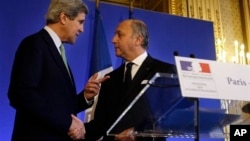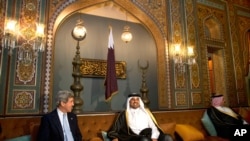PARIS —
Amid reports Washington is considering offering military assistance to Syrian rebels, U.S. Secretary of State John Kerry says Syria's opposition needs more help from the international community to oust President Bashar al-Assad.
On the Paris leg of a nine-nation trip by America's top diplomat, Kerry addressed a joint press conference with French Foreign Minister Laurent Fabius, saying that achieving a political solution to war in Syria requires convincing President Bashar al-Assad that he has no other option.
"He needs to know he can't shoot his way out of this, and so we need to convince him of that," he said. "And I think the opposition needs more help in order to do that, and we are working together to have a united position with respect to that."
While news reports indicate the Obama administration is considering direct military aid for some Syrian rebels, the move would be a first for the Washington, which has previously expressed fears that aid could end up in the wrong hands — notably those of radical Islamists.
Kerry did not confirm the reports, saying only that Washington wants to provide humanitarian assistance to the opposition, to respond to the needs of ordinary Syrians, and to offer an alternative to extremists.
"We think it's very important that more of our assistance is getting to areas that have been liberated from the regime," he said. "And that's not enough. We need to help the Syrian opposition council deliver basic services."
Kerry will be making his case at an international meeting on Syria in Rome on Thursday, where Mouaz al-Khatib, leader of Syria's opposition coalition, is expected to attend after threatening to boycott the meeting for lack of broader international support.
According to Fabius, al-Khatib had made some interesting proposals. Any push for action in Rome, the French foreign minister added, would be echoed in Moscow — an ally of President Assad — when he and French President Francois Hollande visit the Russian capital Thursday.
"We have to make our best [effort], all of us, in order to go to a new period of time," Fabius said. "Because we agree, all of us, on the fact that Mr. Bashar al-Assad has to quit."
Kerry's visit to Paris, which also included talks with President Hollande, also tackled another thorny issue: Iran's nuclear program. With a two-day meeting between Tehran and six world powers just wrapping up in Kazakhstan, Kerry said the U.S. remains open to bilateral talks with Iran.
"[President Obama] has made it clear that he will entertain the notion of a bilateral discussion," said Kerry. "That was made clear during the campaign most recently when he was running for reelection. The issue came up."
After Rome, Kerry heads to Turkey, Egypt and the Gulf Arab states before concluding his first foreign trip as secretary of state.
On the Paris leg of a nine-nation trip by America's top diplomat, Kerry addressed a joint press conference with French Foreign Minister Laurent Fabius, saying that achieving a political solution to war in Syria requires convincing President Bashar al-Assad that he has no other option.
"He needs to know he can't shoot his way out of this, and so we need to convince him of that," he said. "And I think the opposition needs more help in order to do that, and we are working together to have a united position with respect to that."
While news reports indicate the Obama administration is considering direct military aid for some Syrian rebels, the move would be a first for the Washington, which has previously expressed fears that aid could end up in the wrong hands — notably those of radical Islamists.
Kerry did not confirm the reports, saying only that Washington wants to provide humanitarian assistance to the opposition, to respond to the needs of ordinary Syrians, and to offer an alternative to extremists.
"We think it's very important that more of our assistance is getting to areas that have been liberated from the regime," he said. "And that's not enough. We need to help the Syrian opposition council deliver basic services."
Kerry will be making his case at an international meeting on Syria in Rome on Thursday, where Mouaz al-Khatib, leader of Syria's opposition coalition, is expected to attend after threatening to boycott the meeting for lack of broader international support.
According to Fabius, al-Khatib had made some interesting proposals. Any push for action in Rome, the French foreign minister added, would be echoed in Moscow — an ally of President Assad — when he and French President Francois Hollande visit the Russian capital Thursday.
"We have to make our best [effort], all of us, in order to go to a new period of time," Fabius said. "Because we agree, all of us, on the fact that Mr. Bashar al-Assad has to quit."
Kerry's visit to Paris, which also included talks with President Hollande, also tackled another thorny issue: Iran's nuclear program. With a two-day meeting between Tehran and six world powers just wrapping up in Kazakhstan, Kerry said the U.S. remains open to bilateral talks with Iran.
"[President Obama] has made it clear that he will entertain the notion of a bilateral discussion," said Kerry. "That was made clear during the campaign most recently when he was running for reelection. The issue came up."
After Rome, Kerry heads to Turkey, Egypt and the Gulf Arab states before concluding his first foreign trip as secretary of state.









